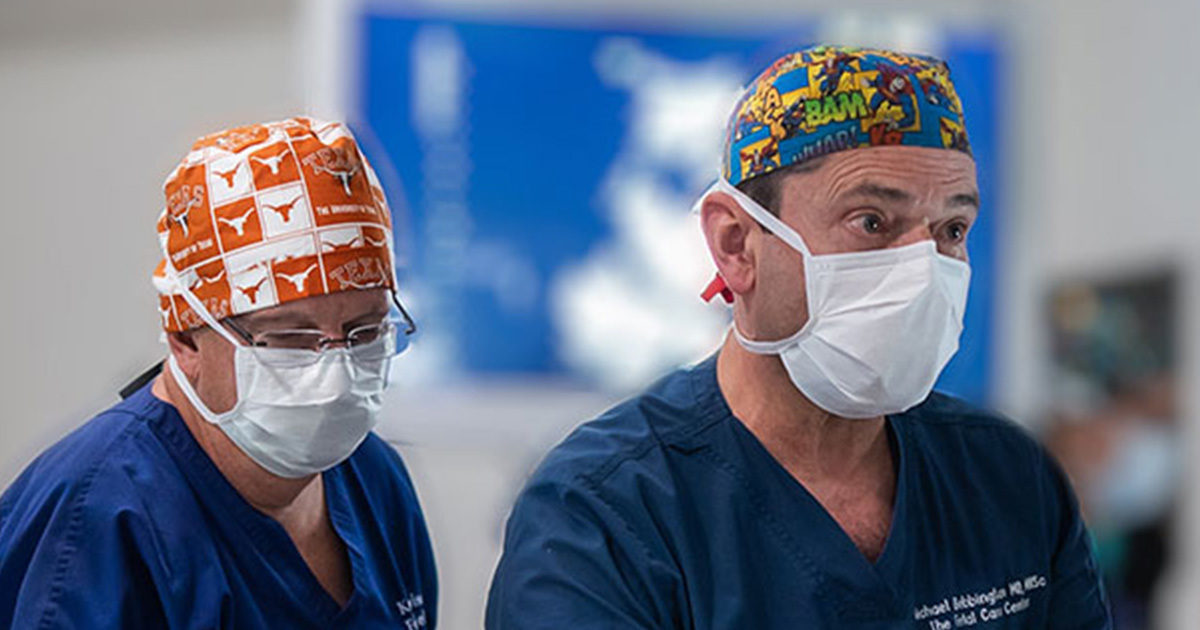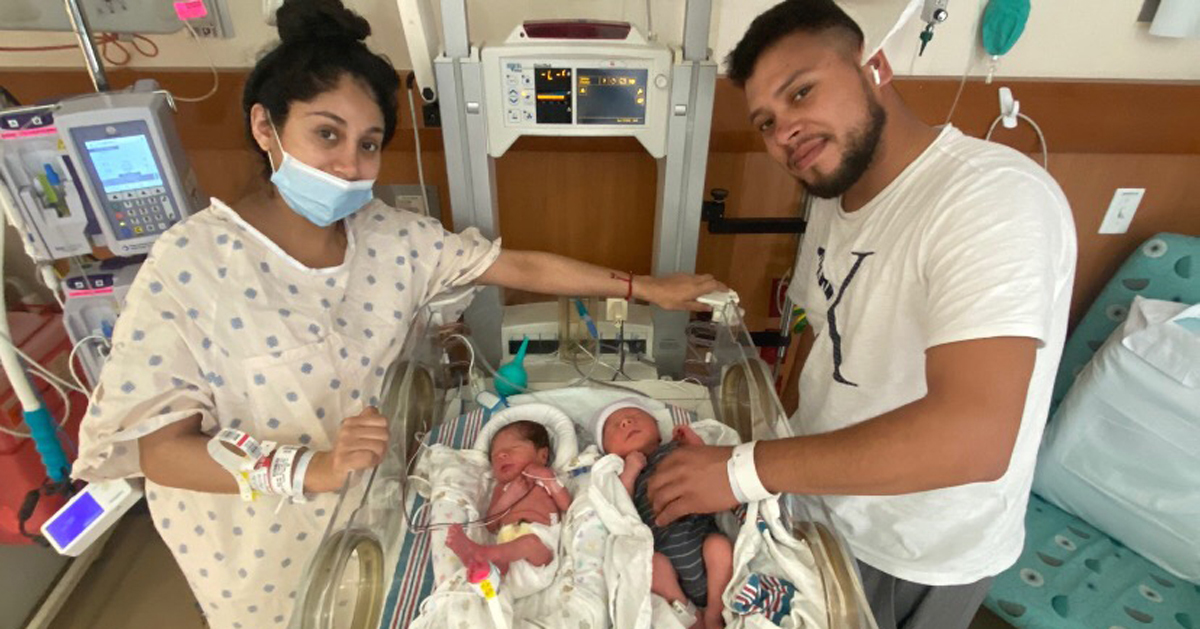In Utero Laser Surgery Saves Unborn Twin Babies
UT Health Austin fetal medicine specialists successfully complete twin-to-twin transfusion syndrome laser surgery, a first for Central Texas
Reviewed by: Michael Bebbington, MD, MHSc
Written by: Ashley Lawrence

On December 9, 2021, the Comprehensive Fetal Care Center, a clinical partnership between UT Health Austin and Dell Children’s Medical Center, successfully completed its first twin-to-twin transfusion syndrome laser surgery. This complex procedure is performed in utero, and the surgical team was led by UT Health Austin fetal medicine specialist Michael Bebbington, MD, MHSc, who was assisted by UT Health Austin fetal medicine specialist Kenneth Moise, Jr., MD, who also serves as the Director of the Comprehensive Fetal Care Center. Both Dr. Bebbington and Dr. Moise have developed fetal centers across the country.
UPDATE: On March 13, 2022, twin babies Yadier and Yasiel were delivered by C-section. Baby Yadier was born at 5 pounds and baby Yasiel at 2.5 pounds. While baby Yadier was admitted to the Dell Children’s nursery, baby Yasiel currently resides in the NICU until he reaches the goal weight of 5 pounds. Both babies and mom are all doing well, and neither twin required the assistance of any life-giving devices.

“Delivering at Dell Children’s was great, because they were able to do everything they could and had all of the equipment here for my babies,” shares Jeanette. “It was better for me to deliver here instead of at a normal hospital.”
“I look forward to them growing up,” continues Jeanette. “I want them to go to college and go do whatever they want to do. I don’t mind if they want to be baseball players just like their dad. My husband was a baseball player. That was his dream, and we named them after his favorite players.”
Twin-to-twin transfusion syndrome (TTTS) is a rare condition that only occurs in monochorionic pregnancies (e.g., identical twins). In this type of twins, the fetuses share one placenta. Blood vessels extend from the site where the umbilical cord attaches to the placenta, allowing oxygen and nutrients essential for growth and development in the womb. The unique feature of monochorionic twins is that blood vessel connections exist between the twins that allow an exchange of blood between the twins. TTTS occurs when an imbalance develops in the blood exchange, causing one twin (the recipient twin) to receive a larger share while the other twin (the donor twin) doesn’t receive enough. Receiving too much blood puts the recipient twin at risk for heart failure as the heart tries to work harder to compensate for the extra blood volume. Giving away more blood than what is being received in return puts the donor twin at risk of malnourishment and organ failure. Fetal surgery is usually necessary to save one or both babies.
26-year-old mother-to-be Jeanette Becerra was referred to the Comprehensive Fetal Care Center at 22 weeks of gestation after it was determined that there were early signs of TTTS seen on an ultrasound. “In order to give both babies the best chance at survival, Dr. Bebbington recommended the surgery, and I’m thankful for this amazing team at Dell Children’s,” shares Jennette.
“If left untreated, there’s about an 85% mortality rate, so, it’s a big deal,” explains Dr. Bebbington. “About 15% of monochorionic twins will develop twin-to-twin transfusion syndrome. Our problem is we can’t anticipate who’s going to get into trouble. Therefore, all of our monochorionic twins have to have a regular ultrasound surveillance so that we can detect early signs.”
Generally, surgery to correct the blood-sharing imbalance caused by TTTS occurs within 24 hours of diagnosis, although some advanced cases may require surgery the same day. “We start at one end of the placenta and map the blood vessels on the surface of the placenta to identify where all of the connections are,” says Dr. Bebbington. “Then, we work our way across the placenta, and anywhere there are connecting vessels, we drop the laser fiber down and use the laser energy to clot the blood in the connecting vessels. By the time we are finished, there’s no more transfusion process. Over time, this allows normal fetal physiology to reestablish itself.”
TTTS laser surgery is an outpatient surgery that takes approximately 1 hour to complete, and the expectant mother is typically discharged the very next day. Mom is prescribed a week of bed rest at home and can gradually return to their normal day-to-day activities. “The earliest case I’ve seen was at 15 weeks and as late as 26 weeks,” shares Dr. Bebbington. “But it seems as though the majority of times when there’s going to be a placental imbalance in flow, it comes earlier on in pregnancy than later.”
The Comprehensive Fetal Care Center provides high-quality care for all types of fetal conditions. Located in the newly opened Dell Children’s Specialty Pavilion that is connected to Dell Children’s Medical Center, the Comprehensive Fetal Care Center is the first and only comprehensive program in Central Texas that provides care for babies with congenital conditions before, during, and after birth, including care for the mother and baby during pregnancy, delivery of the baby, and care of the baby after birth, all in one place.
Patients being cared for by the Comprehensive Fetal Care Center are able to receive their obstetrical care at the Maternal Care Center (MCC), a high-risk obstetrics clinic located in the same suite as the Comprehensive Fetal Care Center. This integration of maternal and fetal care enhances the overall experience for patients and their families and allows for close collaboration between fetal medicine specialists and obstetricians. Consultation with fellowship-trained maternal-fetal medicine specialists is also available at the MCC for more complicated maternal medical conditions.
Dell Children’s recently opened a Specialized Delivery Unit (SDU), an 11-bed labor and delivery unit that provides comprehensive care to healthy mothers and their high-risk babies who are being cared for at the Comprehensive Fetal Care Center. Through this addition, babies gain access to the Dell Children’s Level IV Neonatal Intensive Care Unit (NICU), which has earned the highest designation possible for its ability to care for the most complex and critically-ill infants of all gestational ages. Special delivery services are available 24 hours a day, 7 days a week.
The Comprehensive Fetal Care Center will soon begin offering in utero surgeries for patients carrying babies diagnosed with spina bifida. During the procedure, the mother’s abdomen is opened to access the baby’s back and repair the hole in the baby’s spine. “That is a whole other level of intensity,” says Dr. Bebbington. This surgery requires the assistance of nearly three dozen people and takes five hours to complete.
For more information about the Comprehensive Fetal Care Center or to request an appointment, call 1-512-324-0040 or visit here.